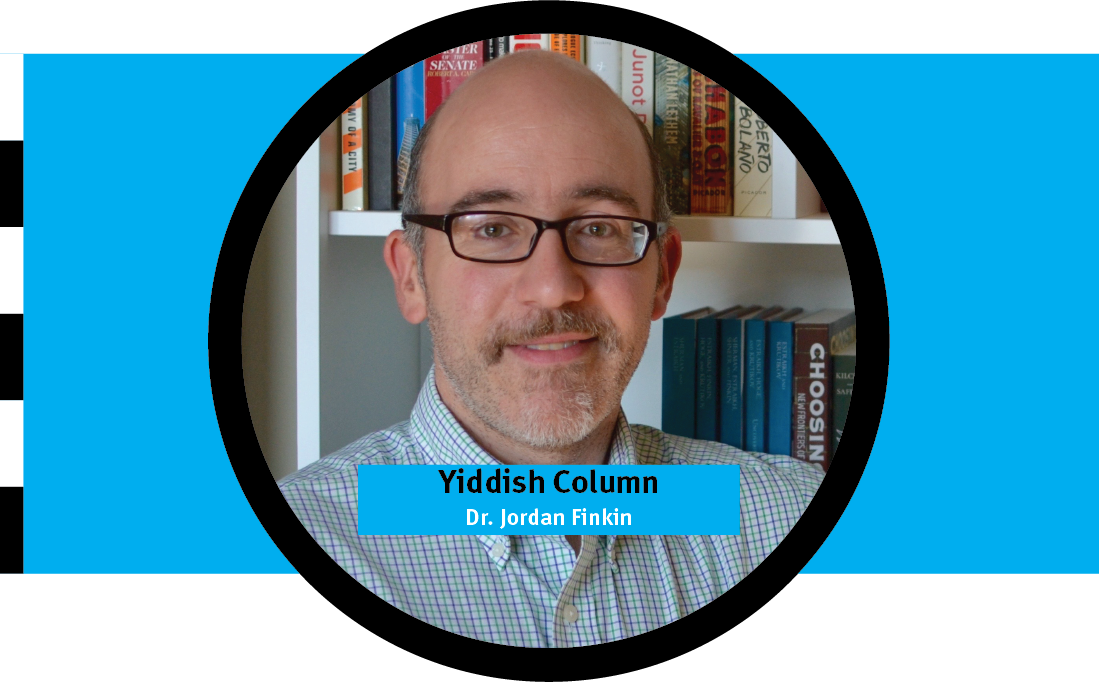Well, here I was in “yánuar” (January), firmly embarked on the new year, only to be felled by what devotees of The Goon Show would call the lurgi, and what in Yiddish we would call a “khalás.” (In this case likely a “farkílung” — or a “grípe” — that is, a cold, and thankfully not “inflyuéntsye,” which can be shortened to “fléntsye.”) “Khalás” is a slightly judgmental term for an illness. The judgmental form of the adjective again, interestingly, uses the Hebrew word, “khóyle,” while the unmarked adjective for sick is “krank.” And as the old saying goes, “az an óreman est a hun iz ér krank oder di hun” — when a poor man eats a chicken, either he’s sick or the chicken.
Yiddish employs a full array of component creativity in the vocabulary of ailment. An illness or disease can be, as I wrote above, “khalás” (from the Hebraic component), “kránkeyt” or “krenk” (from the Germanic component), or “khoróbe” (from the Slavic component, with the variants “kharóbe” and “khvaróbe”), all with various shades of meaning depending on context. One can speak rather uncritically of an “áyngerédte krenk” to mean a feigned or imaginary illness, or indeed hypochondria. But one can also use the phrase “pánske khoróbe” with the same basic meaning. But “pánske” is an adjective having to do with (Polish) noblemen. The effect is that of a rather vulgar appraisal: hypochondria is the “nobleman’s disease.” (If that’s the case, then I’m a duke!)
Sickliness — that is, regular or continued illness — has a number of related variants. “Sickly” can be rendered “krénklekh,” “krénkevdik,” or “kránkevdik.” However, “sickly” as a pejorative or disparaging adjective would be “krankeváte” or “khoyleváte.” A sickly person is either a “khólesh” (another Hebraic word) or a “kherlyák.” A chronic illness, by contrast, is a “farshlépte krenk” (literally a prolonged illness). The phrase can also be used humorously to mean a wisenheimer. And to bring it all into the Jewish ambit: “a yid hot tsayt nor gelt tsu farlírn un krank tsy zayn” — A Jew has time only to lose money and to be sick.
Of course there are all kinds of words in Yiddish for various ailments, illnesses, and diseases. Two, however, have a special place. “Pokn” is smallpox; it is also the verb for having smallpox. (Incidentally, chickenpox in Yiddish is “víndpokn,” literally “wind pox,” which was borrowed from the German, Windpocken. The idea is that it is a disease carried aloft on the air, that is, highly contagious. The word chickenpox itself has nothing to do with chickens but is apparently so named because of the similarity of the pox to chickpeas.) Similarly, “mózlen” is both the measles and the verb for having them. The expression “gepókt un gemózlt” literally means “having had smallpox and measles.” It has come to mean having run the gauntlet of difficulties, usually at the beginning of a new undertaking or enterprise.
I have mentioned in an earlier column the traditional hierarchy of medical practitioners, with “doktóyrim” (doctors) at the bottom. However, despite Yiddish culture’s deep skepticism of the medical profession, I feel what seems like a nearly genetic imperative for my children to be doctors. (As my father told me before going to college, “You can be whatever you want…as soon as you graduate from medical school.”) With that in mind, I recently saw the following rapid-fire listing in a Yiddish lexicon: “der shlof iz der béster dókter” (sleep is the best doctor); “di tsayt iz der béster dókter” (time is the best doctor); “der toyt iz der béster dókter” (death is the best doctor); and “got iz der béster dókter” (God is the best doctor). But never does one encounter “a gúter dókter iz der béster dókter” (a good doctor is the best doctor).
While “krenk” can mean an illness, it is also a more slangy way of saying “nada” or “zilch.” For example, “visn a krenk” or “farshtéyn a krenk” (literally, knowing zilch, or understanding zippo) means being woefully ignorant. Putting this together with the last comment about doctors, there is an expression: “er iz a dókter, er veys a krenk.” This plays on the polysemy of the word “krenk” as both illness and nothing. “He is a doctor, he knows a disease when he sees it” exists alongside “He is a doctor, he knows nothing at all.”
That said, and just so that you don’t think there is only skepticism in Yiddish of professional physicians: “az s’iz do a dókter in shtub zénen ale gezúnt, az s’iz do broyt in shtub zénen ale zat”—When there’s a doctor in the house, everyone’s healthy; when there’s bread in the house, everyone’s full.
So, wishing you all health and satiety in the New Year. And as always, “léyent gezúnterhéyt”—read it in good health.
Please send Yiddish questions to: yiddishcolumn@americanisraelite.com


